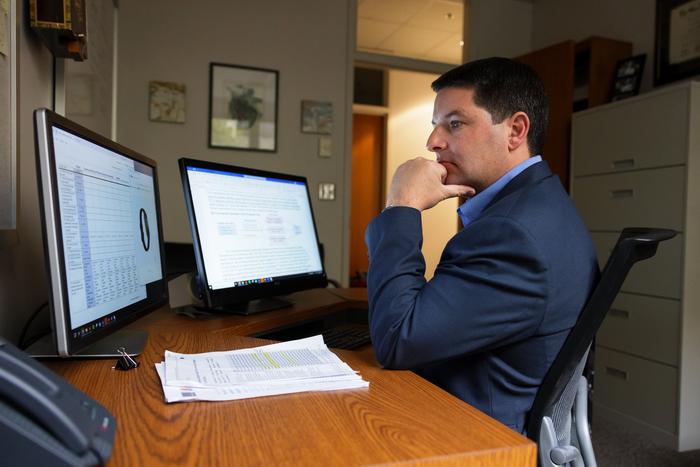INDIANAPOLIS — It’s no secret that a good night’s rest can do wonders for one’s health, but those who struggle with insomnia have a nearly 50% increased risk of cardiovascular disease. One scientist in the School of Science at IUPUI will spend the next five years trying to figure out how those risks can be reduced.

Credit: Liz Kaye, Indiana University
INDIANAPOLIS — It’s no secret that a good night’s rest can do wonders for one’s health, but those who struggle with insomnia have a nearly 50% increased risk of cardiovascular disease. One scientist in the School of Science at IUPUI will spend the next five years trying to figure out how those risks can be reduced.
Jesse Stewart, a professor of psychology at the school, has received a five-year, $3 million grant from the National Institutes of Health’s National Heart, Lung and Blood Institute for a project named the Strengthening Hearts by Addressing Disrupted Sleep, or SHADES, Mechanistic Trial.
The aim of the SHADES trial is to discover whether the treatment of insomnia can reduce the risk for cardiovascular disease.
“There’s a growing body of research linking various issues with sleep and future risk for developing cardiovascular disease,” Stewart said. “What’s not known is whether that connection is causal. By that, I mean if we treat the insomnia, if we treat the sleep problems, if we improve sleep, does that lower cardiovascular disease risk similar to treating high blood pressure or high cholesterol? That’s what we’re hoping to find out.”
The SHADES trial will recruit 200 patients with insomnia from eight primary-care clinics at Eskenazi Health. Patients will be randomly assigned to two groups and be treated for six months. Half of the trial participants will receive “modernized collaborative care” for insomnia; the other half will receive standard primary care for insomnia, with some added benefits.
The modernized collaborative care features what Stewart calls the “gold standard” treatment for insomnia: cognitive behavioral therapy, or CBT-I. Patients under this treatment plan will receive CBT-I online, via telephone or in person. The other group will receive education about sleep and “sleep hygiene,” have their insomnia symptoms monitored and visit their primary-care providers.
To determine the impact of insomnia treatment on cardiovascular disease risk, Stewart and his collaborators will obtain blood-based measures of systemic inflammation, such as C-reactive protein, as well as measurements of metabolic dysregulation, such as blood sugar levels. They will also obtain physiological measures of autonomic nervous system dysfunction in both the sympathetic and parasympathetic branches.
“We expect our CBT-I treatment to beat the control, which will allow us to dive into whether or not improving insomnia trickles down to biological mechanisms involved in the development of cardiovascular disease,” Stewart said. “By following people for six months, we hope to see markers of cardiovascular risk improve. Those same markers have been shown in other studies to predict future heart attacks and strokes.”
A modernized collaborative care approach was also the focus of Stewart’s research on relationship between depression and cardiovascular disease published this year in the journal Brain, Behavior and Immunity. Because of differences in treatment for depression and insomnia, as well as encountered barriers to treatment, Stewart decided to modify the treatment approach in the SHADES trial.
For instance, basic computer training and tablets — with unlimited data plans for those without a computer with internet access — are now available to patients in the trial.
“We’re making treatment more accessible than in the past, building off our prior work and bridging the digital divide,” Stewart said. “The idea is to make these treatments more accessible and convenient by using technology. Then, if we need to or prefer it, they can come in and meet face-to-face with a therapist.”
Overall, through the SHADES trial and other research projects, Stewart strives to advance understanding of the links between psychological factors, their treatment and cardiovascular disease risk in the hopes of developing new approaches to prevent cardiovascular disease.
“There are a lot of missed opportunities to prevent disease and improve the health of people in the world, and I hope to shed some light on that,” he said. “The long-term goal is to broaden the view of cardiovascular disease risk factors and to motivate screening and treatment programs, like for insomnia, to address these currently unaddressed, potentially causal cardiovascular risk factors.”
Researchers on the SHADES trial team include Wei Wu from the School of Science at IUPUI; Yelena Chernyak, Robert Considine, Babar Kahn and Subha Raman of the Indiana University School of Medicine; Julie Otte of the IU School of Nursing; Krysha MacDonald from Eskenazi Health; Lee Ritterband and Karen Ingersoll from the University of Virginia; and Michael Irwin from University of California at Los Angeles. Research partners include the Indiana Clinical and Translational Sciences Institute, Regenstrief Institute, University of Virginia and UCLA.




